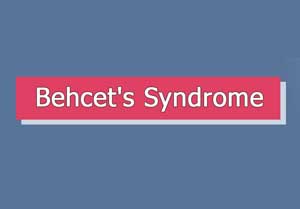- Home
- Editorial
- News
- Practice Guidelines
- Anesthesiology Guidelines
- Cancer Guidelines
- Cardiac Sciences Guidelines
- Critical Care Guidelines
- Dentistry Guidelines
- Dermatology Guidelines
- Diabetes and Endo Guidelines
- Diagnostics Guidelines
- ENT Guidelines
- Featured Practice Guidelines
- Gastroenterology Guidelines
- Geriatrics Guidelines
- Medicine Guidelines
- Nephrology Guidelines
- Neurosciences Guidelines
- Obs and Gynae Guidelines
- Ophthalmology Guidelines
- Orthopaedics Guidelines
- Paediatrics Guidelines
- Psychiatry Guidelines
- Pulmonology Guidelines
- Radiology Guidelines
- Surgery Guidelines
- Urology Guidelines
Behçet’s disease linked to three fold risk of ischemic stroke, finds study

Patients with Behçet’s disease (BD) have a 3 folds high risk of ischemic stroke, revealed a study published in PLOS.
Behcet’s disease, also known as an oculo-orogenital syndrome, is a chronic remitting and relapsing inflammatory disorder characterized by recurrent oral aphthous ulcers, genital ulcerations, ocular manifestations (e.g., uveitis, conjunctivitis) and other systemic involvement. It is also known as Behcet syndrome and Malignant aphthosis. It is an autoimmune multisystem disease often affecting young adults and its pathological origin is unclear.
Patients with BD might have an elevated risk of ischemic stroke because of recurrent inflammation of blood vessels in the brain plays a crucial role in the development of ischemic stroke. There are only a few studies which have addressed this association but this is the first epidemiological study of its kind. This study aimed to investigate the relation between BD and subsequent ischemic stroke in Taiwan using a nationwide, population-based database.
To establish a study cohort, the longitudinal data of 306 patients newly diagnosed with BD during 2000–2010 were extracted from the National Health Insurance Research Database, Taiwan. For comparison of ischemic stroke incidence, a control cohort of 1224 subjects without BD was established using a frequency-matched ratio of 1:4 for age, sex, and pre-existing comorbidities.
Key findings
- During the 10-year follow-up, 13 (4.2%) patients with BD and 20 (1.6%) control subjects experienced an ischemic stroke.
- Kaplan–Meier analysis revealed the higher prevalence of ischemic stroke in the BD group.
- After adjusting for comorbidities and demographic characteristics, the Cox regression analysis revealed that patients with BD had a 2.77-fold risk of ischemic stroke compared to control subjects.
Patients with BD have an elevated risk of ischemic stroke. Hence, BD may affect the vascular system in the brain, resulting in a stroke event, the authors wrote.
Read also: Indian doctors report an unusual cause of fever: Behcet syndrome
For more reference, please click on the link

Disclaimer: This site is primarily intended for healthcare professionals. Any content/information on this website does not replace the advice of medical and/or health professionals and should not be construed as medical/diagnostic advice/endorsement or prescription. Use of this site is subject to our terms of use, privacy policy, advertisement policy. © 2020 Minerva Medical Treatment Pvt Ltd